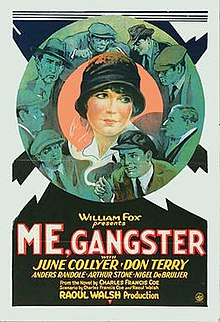
Carole Lombard was an American actress. In 1999, the American Film Institute ranked Lombard 23rd on its list of the greatest female stars of Classic Hollywood Cinema.
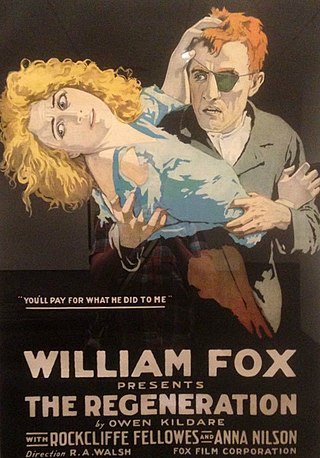
Regeneration is a 1915 American silent biographical crime drama co-written and directed by Raoul Walsh. The film, which was the first full-length feature film directed by Walsh, stars Rockliffe Fellowes and Anna Q. Nilsson and was adapted for the screen by Carl Harbaugh and Walsh from the 1903 memoir My Mamie Rose, by Owen Frawley Kildare and the adapted 1908 play by Kildare and Walter C. Hackett.
Sadie Thompson is a 1928 American silent drama film that tells the story of a "fallen woman" who comes to Pago Pago to start a new life, but encounters a zealous missionary who wants to force her back to her former life in San Francisco. The film stars Gloria Swanson, Lionel Barrymore, and Raoul Walsh, and it is one of Swanson's more successful films. Due to the public's apathy towards silent films, a sound version was prepared in the latter half of 1928. While the sound version has no audible dialog, it features a synchronized musical score with sound effects along with a theme song.

Raoul Walsh was an American film director, actor, founding member of the Academy of Motion Picture Arts and Sciences (AMPAS), and the brother of silent screen actor George Walsh. He was known for portraying John Wilkes Booth in the silent film The Birth of a Nation (1915) and for directing such films as the widescreen epic The Big Trail (1930) starring John Wayne in his first leading role, The Roaring Twenties starring James Cagney and Humphrey Bogart, High Sierra (1941) starring Ida Lupino and Humphrey Bogart, and White Heat (1949) starring James Cagney and Edmond O'Brien. He directed his last film in 1964. His work has been noted as influences on directors such as Rainer Werner Fassbinder, Jack Hill, and Martin Scorsese.
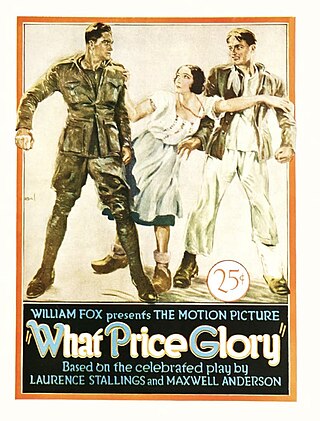
What Price Glory? is a 1926 American synchronized sound comedy-drama war film produced and distributed by Fox Film Corporation and directed by Raoul Walsh. The film was released with a synchronized musical score with sound effects using the Movietone sound system. The film is based on the 1924 play What Price Glory by Maxwell Anderson and Laurence Stallings and was remade in 1952 as What Price Glory starring James Cagney. Malcolm Stuart Boylan, founder of the U.S. Coast Guard Auxiliary, was title writer on the silent Fox attraction.

The Viking is a 1928 American synchronized sound drama film. While the film has no audible dialog, it was released with a synchronized musical score with sound effects using the sound-on-film Western Electric Sound System process. This film was the first feature-length Technicolor film that featured a soundtrack, and it was the first film made in Technicolor's Process 3. It stars Pauline Starke, Donald Crisp, and LeRoy Mason. The film is loosely based on the 1902 novel The Thrall of Leif the Lucky by Ottilie A. Liljencrantz. The Viking was directed by Roy William Neill.
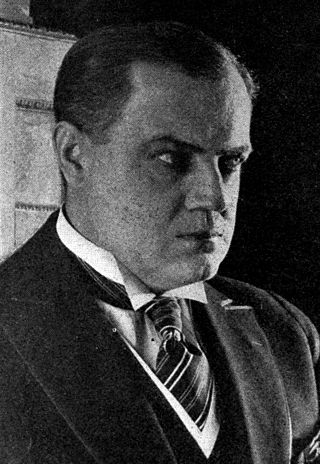
Anders Randolf was a Danish American actor in American films from 1913 to 1930.

4 Devils is a lost 1928 American sound drama film directed by German director F. W. Murnau and starring Janet Gaynor. While the original release has no audible dialog, it was released with a synchronized musical score with sound effects using both the sound-on-disc and sound-on-film process.

The Gay Bride is a 1934 gangster film-screwball comedy starring Carole Lombard as a wisecracking gold-digger and Chester Morris as the poor man she despises. It was directed by Jack Conway and written by the husband-and-wife team of Sam and Bella Spewak, based on the story "Repeal" by Charles Francis Coe.

Gable and Lombard is a 1976 American biographical film directed by Sidney J. Furie. The screenplay by Barry Sandler is based on the romance and consequent marriage of screen stars Clark Gable and Carole Lombard. The original music score was composed by Michel Legrand.
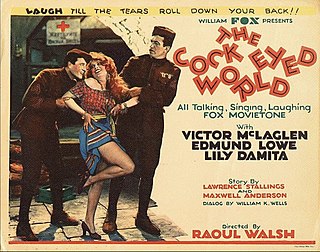
The Cock-Eyed World is a 1929 American pre-Code musical comedy feature film. One of the earliest "talkies", it was a sequel to What Price Glory? (1926), it was directed and written by Raoul Walsh and based on the Flagg and Quirt story by Maxwell Anderson, Tom Barry, Wilson Mizner, and Laurence Stallings. Fox Film Corporation released the film at the Roxy in New York on August 3, 1929.

Esther and the King is a 1960 American-Italian religious epic film produced and directed by Raoul Walsh and starring Joan Collins as Esther, Richard Egan as Ahasuerus, and Denis O'Dea as Mordecai. Walsh and Michael Elkins wrote the screenplay, which was based on the Book of Esther of the Hebrew Bible and the Old Testament. It recounts the origin of the Jewish celebration of Purim.
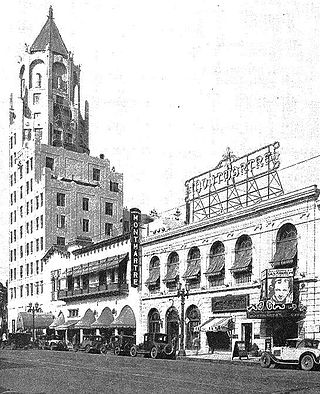
Café Montmartre was a restaurant and nightclub on Hollywood Boulevard at Highland Avenue in Hollywood, Los Angeles, California, US. Opened in 1923, it became a "worldwide center for celebrity and nightlife" during the 1920s and a place where tourists would visit to try to break into Hollywood.

Not Quite Decent is a 1929 American sound part-talkie Pre-Code film, produced and distributed by Fox Film Corporation, directed by Irving Cummings, and starring June Collyer and Louise Dresser. In addition to sequences with audible dialogue or talking sequences, the film features a synchronized musical score and sound effects along with English intertitles. The soundtrack was recorded using the Movietone sound-on-film system.
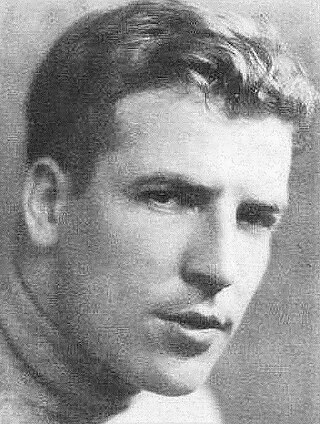
Don Terry was an American film actor, best known for his lead appearances in B films and serials in the 1930s and early 1940s. Perhaps his best-known role is Naval Commander Don Winslow in two Universal Pictures serials of the early 1940s, Don Winslow of the Navy (1942) and Don Winslow of the Coast Guard (1943).
Powder My Back is a 1928 synchronized sound film comedy directed by Roy Del Ruth and starring Irene Rich. While the film has no audible dialog, it was released with a synchronized musical score with sound effects using the sound-on-disc Vitaphone process. The film was produced and distributed by Warner Bros.

Show Folks is a 1928 American part-talkie sound drama film directed by Paul L. Stein and starring Eddie Quillan, Lina Basquette, and Carole Lombard. Although the film featured a few sequences with audible dialogue, the majority of the film had a synchronized musical score with sound effects. The film was released in both the sound-on-disc and sound-on-film format.
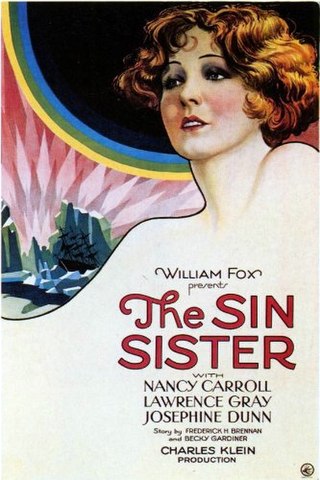
The Sin Sister is a lost 1929 American sound drama adventure film directed by Charles Klein and starring Nancy Carroll. While the film has no audible dialog, it was released with a synchronized musical score with sound effects using both the sound-on-disc and sound-on-film process. It was produced and distributed by the Fox Film Corporation.
Slightly Used is a 1927 American synchronized sound comedy film directed by Archie Mayo and written by C. Graham Baker and Jack Jarmuth. While the film has no audible dialog, it was released with a synchronized musical score with sound effects using the Vitaphone sound-on-disc process. The film stars May McAvoy, Conrad Nagel, Robert Agnew, Audrey Ferris, Anders Randolf and Eugenie Besserer. The film was released by Warner Bros. on September 3, 1927.

Blindfold is a 1928 American synchronized sound drama film directed by Charles Klein and written by Ewart Adamson, Robert Horwood and William Kernell. While the film has no audible dialog, it was released with a synchronized musical score with sound effects using the sound-on-film movietone process. The film stars Lois Moran, George O'Brien, Maria Alba, Earle Foxe, Don Terry and Fritz Feld. The film was released on December 9, 1928, by Fox Film Corporation. It was based on a story by Charles Francis Coe.
